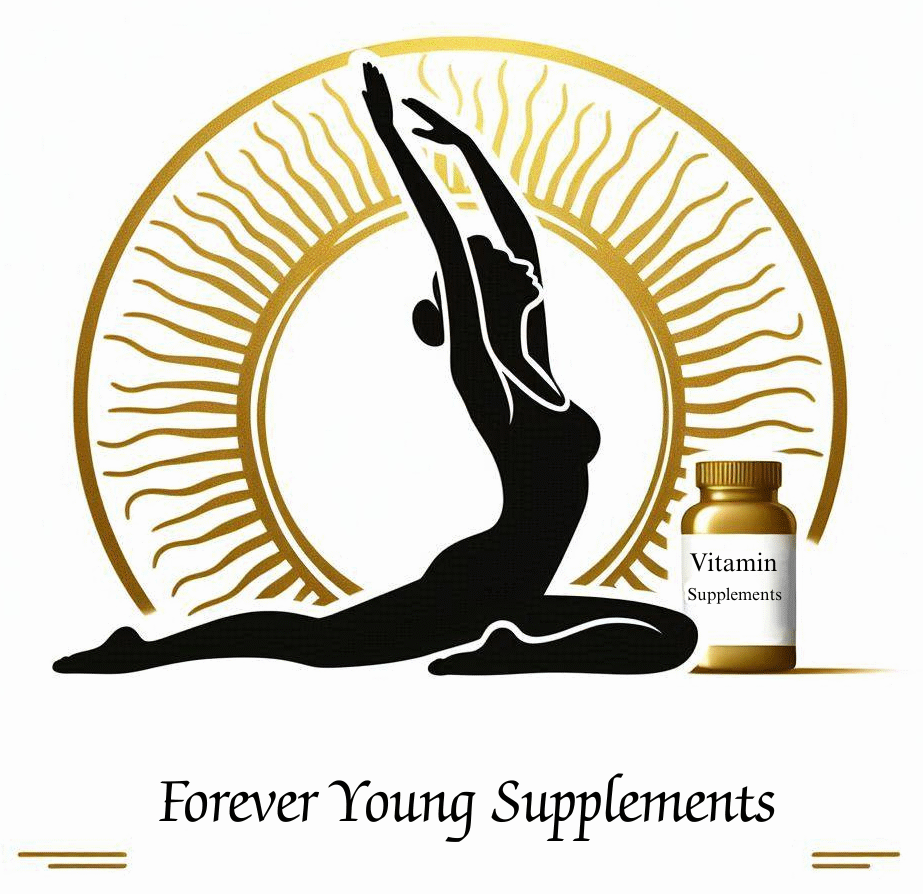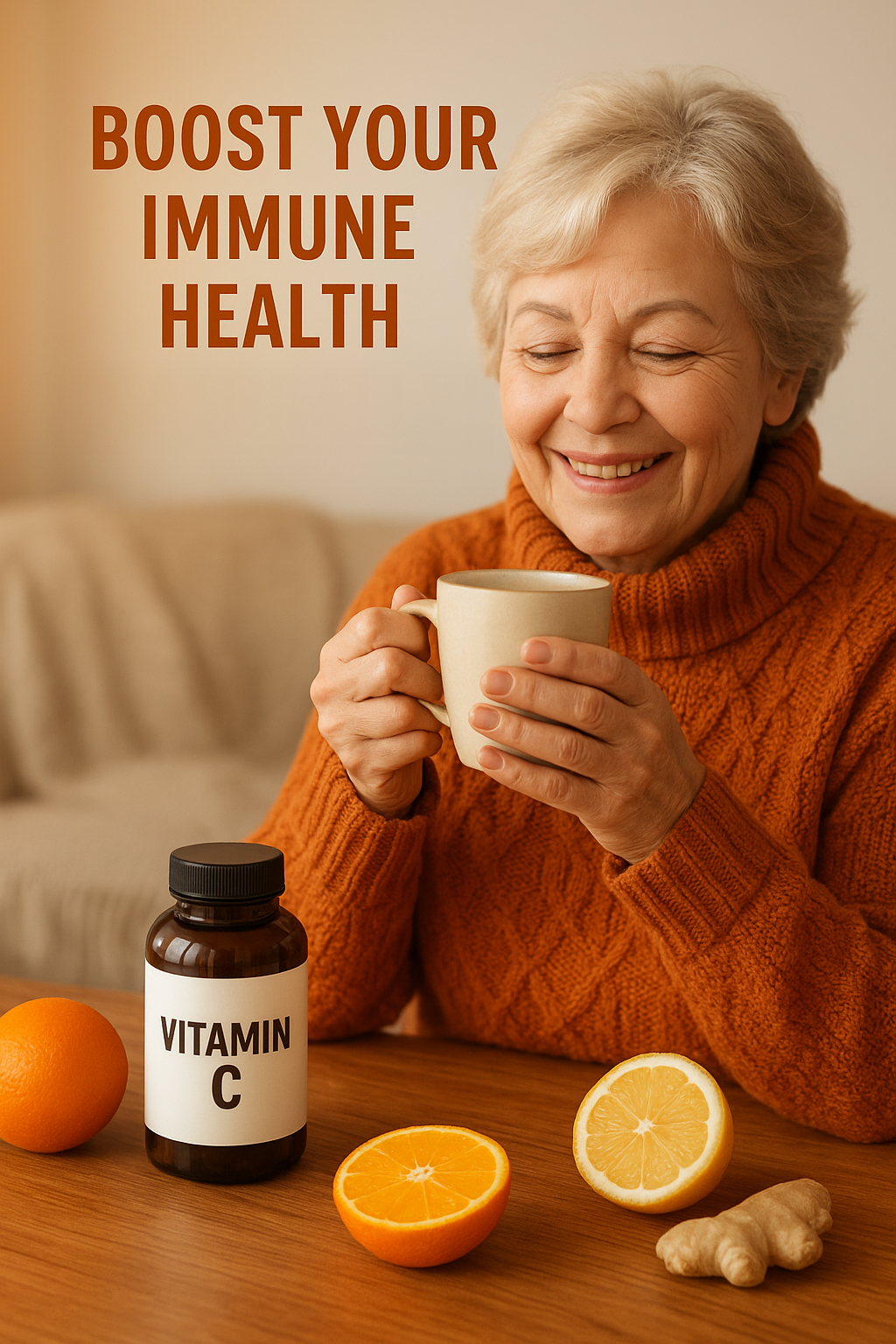The immune system is the body’s natural defense, guarding against infections and keeping everything in balance. As we age, however, this defense weakens. Seniors often face a natural decline in immune function, making them more vulnerable to infections, slower recovery times, and chronic health challenges.
I have experienced this firsthand in recent winters and bouncing back from a simple cold isn’t as quick or easy as it used to be. This gradual change, known as immunosenescence, is part of the normal aging process.
But the good news is that with the right vitamins, minerals, and lifestyle habits, seniors can give their immune system the extra support it needs to stay strong.
In this article, we’ll look at the best immune-boosting vitamins for seniors, explore essential minerals and nutrients, and share lifestyle strategies to keep older adults healthy and resilient year-round.
Why Does Immune Health Declines with Age?
The immune system is the body’s natural defense against viruses, bacteria, and other harmful invaders. But as we get older, this defense system doesn’t function as efficiently as it once did. The reasons are as follows:
Immunosenescence: This is a reduction in white blood cell production, making it harder to fight infections.

Chronic inflammation: Seniors are more prone to a low-level, persistent inflammation called inflammaging, which can weaken immunity.
Nutrient absorption issues: Many older adults experience reduced nutrient absorption in the digestive tract, making deficiencies more common.
Lifestyle factors: Medications, reduced activity, poor diet, or lack of sun exposure (Vitamin D) all contribute to weaker immunity.
This makes it even more important for seniors to support their immune systems through diet, vitamins, and supplements.
Dietary Foundations for a Strong Immune System
Eating right isn’t just about keeping the waistline in check, it’s absolutely critical for immune health. Certain nutrients play a starring role in keeping the immune system in fighting shape. We are talking about zinc, selenium, iron, and vitamins that provide the body with the tools it needs to knock out invaders.
A nutrient-rich diet forms the backbone of strong immunity. For seniors, balancing what you eat can make all the difference. Incorporate a colorful array of fruits and vegetables to provide antioxidants, fibres, and essential vitamins. Lean proteins, such as poultry and legumes, play their part by supporting cell repair and growth.
Whole grains and healthy fats, like olive oil and nuts, should also be in your meal planss and they contribute so much to reducing inflammation and supporting heart health, which indirectly supports the immune system too.
Meal tips? Swap out snacks with fruits like oranges for a vitamin C boost or sprinkle some almonds over your morning oatmeal for a dose of vitamin E. Incorporate fatty fish or fortified cereals to keep your vitamin D levels up, especially important as natural production through sunlight wanes with age.

Staying consistent with nutritional habits ensures the body is prepared when germs come knocking. Making small yet impactful changes in everyday meals can cement the foundation for robust immune health, particularly for seniors looking to keep that zing in every step.
Best Vitamins to Enhance Immune Function in Seniors
When it comes to ramping up immune health, some vitamins steal the spotlight, especially for seniors.
Vitamin D – The Sunshine Vitamin
This often gets top billing as the go-to immune booster. Not just your bones that sing its praises, but it plays a significant role in immune regulation too. Many seniors find themselves lacking in this vitamin, primarily due to less sun exposure. Taking a supplement or eating foods rich in vitamin D can bridge that gap.
Food sources: fortified dairy, salmon, eggs.
Supplementation: Many seniors need 800–2000 IU daily, though individual needs vary.
Vitamin C – The Immune Superstar
Vitamin C is another powerhouse, often topping the list for reducing inflammation and supporting immune defense. It helps in the production of white blood cells, crucial for warding off infections.
Food sources: citrus fruits, strawberries, bell peppers, broccoli.
Supplementation: A daily dose of 500–1000 mg is common for immune support.
Vitamin E – Antioxidant Protection,
This essential Vitamin protects cells from damage and also enhances immune cell function, especially important for older adults. Vitamin E is a powerful antioxidant that supports T-cell function and defends against cellular damage, which plays a central role in immunity.
Food sources: nuts (almonds), seeds, spinach, sunflower oil.
Supplementation: Often included in multivitamins; look for natural forms (d-alpha tocopherol).
Vitamin B Complex – Energy and Immune Support.
B vitamins—particularly B6, B12, and folate—support energy metabolism and immune cell production. Seniors are at higher risk of B12 deficiency due to reduced stomach acid production.
Food sources: poultry, fish, leafy greens, fortified cereals.
Supplementation: Many seniors benefit from a B-complex or standalone B12 supplement.
Incorporating these vitamins through food is your best bet to keep things natural. However, sometimes supplements are necessary to fill in nutritional gaps. It might be wise to discuss with a healthcare provider to tailor your vitamin intake to meet personal needs, ensuring that you are not just taking guesses at what you need.
Key Minerals & Nutrients for Immune Support
Minerals can support the immune system as metal ions in some enzymes and other biologically activated compounds that serve to regulate inflammation, and facilitate the function of immune cells like white blood cells. Key minerals for immune health include Zinc and Selenium.
Zinc – Defender of the Immune System is critical for immune cell function and wound healing. Even a mild deficiency can impair immunity. Seniors often consume less zinc through diet, making supplementation valuable.
Food sources: meat, shellfish, pumpkin seeds, beans.
Supplementation: Typically 8–11 mg daily for adults.
Selenium – The Antioxidant Ally helps reduce oxidative stress and supports the production of infection-fighting cells. Low selenium levels have been linked to weaker immune defenses.
Food sources: Brazil nuts, tuna, eggs.
Supplementation: Small doses are usually sufficient, as high intake can be harmful.
Probiotics – Gut Health and Immunity.
Up to 70% of the immune system resides in the gut. A healthy gut microbiome supports immune defense, making probiotics an important tool for seniors.
Sources: yogurt, kefir, sauerkraut, probiotic supplements.
Benefits: improved digestion, reduced infections, enhanced immune signaling.
Lifestyle Adjustments: Beyond Vitamins
Living well goes beyond just taking the right vitamins. Regular exercise is a very effective way to boost immune health. Staying active keeps the blood flowing, reduces inflammation, and promotes the turnover of immune cells. Gentle exercises like walking, swimming, or yoga can be immensely beneficial for seniors, ensuring they keep moving without overdoing it.
While exercise is crucial, getting enough rest and sleep is also a foundation to a healthy lifestyle. Sleep is when our bodies repair and rejuvenate, making it a true ally for the immune system. Aiming for 7-9 hours of quality sleep boosts immune function and helps keep illnesses at bay.
Stress management may sound like a wellness buzzword, but it genuinely does matter for immune health. High stress levels can wreak havoc on the body, suppressing immune responses. Finding what relaxes you, whether it is meditation, gardening, or simply unwinding with a good book, can decrease stress levels and keep the immune system in check.
Hydration is another unsung hero in immune health. Water is essential for all bodily functions, including the immune system. It helps remove toxins and transport nutrients to cells, aiding in overall health. Sipping on water regularly, even when you are not particularly thirsty, ensures the body functions optimally.

These lifestyle choices work in tandem with a good diet to create a robust defense against infections. It’s about creating a holistic lifestyle that supports a well rounded immune system, making sure seniors can enjoy life’s adventures with resilience and vigor.
Supplementation: When Diet Isn’t Enough
While a balanced diet does wonders, there are times when diet alone might not cover all bases, especially for seniors. This is where supplements step in to fill those nutritional gaps, ensuring the immune system gets what it needs.
Choosing the right supplement can feel like navigating a supermarket’s cereal aisle. Quality matters, so opting for reputable brands known for rigorous testing can make a difference. Look for supplements that are certified by external organizations to ensure you are getting the real deal.
Supplementation isn’t a one-size-fits-all situation. Depending on individual health, lifestyle, and diet, a healthcare provider might recommend different types or dosages. It is this customized approach that ensures seniors get the right support without any unnecessary risks and definitely advisable to always seek advice from a doctor or healthcare provider before implementing a new or change in supplementation.
Having said that supplements are worth taking into consideratiom as part of a broader strategy of creating a stronger, more resilient immune system. They add an edge but need to be part of a balanced approach that includes diet, exercise, and stress management. This comprehensive strategy helps maintain health so seniors can enjoy every chapter of life with gusto.
Conclusion: Taking a Holistic Approach to Immune Health
Building a resilient immune system doesn’t hinge on one single factor, it’s a cocktail of diet, lifestyle, and sometimes supplementation working together in harmony. Each element enhances the other, creating a sturdy shield that keeps the body fighting fit.
For seniors, this holistic approach ensures that the body is equipped to handle health setbacks with minimal fuss. It empowers older adults to live life fully, embracing every opportunity to engage actively with the world around them.
Key habits like maintaining a nutrient-rich diet, staying active, managing stress, and ensuring adequate sleep are more than just good advice, they are essential components of a healthy forward living plan. Supplements play a supportive role in this mix but should always be considered carefully, with professional guidance.
Encouraging an integrated approach means creating lifelong habits, ones that can be adjusted as circumstances change but always centered on promoting well-being. It’s about valuing health as a precious asset, one to nurture continually.
Seniors taking proactive steps to enhance their immune health set the stage for a vibrant and fulfilling life. This commitment ensures the capacity to cherish every moment, confidently tackling whatever comes their way, and truly living the essence of well-being.
Quick Immune-Boosting Checklist for Seniors
- Eat colorful fruits and vegetables daily
- Include lean protein, whole grains, and healthy fats
- Focus on vitamins: D, C, E, and B-complex
- Add zinc, selenium, and probiotics to your diet
- Stay active and get regular exercise
- Prioritize sleep (7–9 hours nightly)
- Manage stress with hobbies or mindfulness
- Drink plenty of water
- Keep vaccinations up to date
- Consult your doctor before starting new supplements
FAQ
1. What vitamins are most important for seniors to boost immunity?
The key vitamins for seniors include Vitamin D, Vitamin C, Vitamin E, and the B-complex vitamins (especially B6, B12, and folate). These vitamins support immune cell function, reduce inflammation, and help the body fight infections more effectively.
2. Can lifestyle habits improve immune health in older adults?
Yes. Regular exercise, adequate sleep, stress management, and proper hydration all contribute to stronger immunity. Combining these habits with a nutrient-rich diet enhances overall immune function in seniors.
3. When should seniors consider taking supplements?
Supplements can help fill nutritional gaps when diet alone isn’t enough, particularly for Vitamin D, B12, zinc, and probiotics. It’s important to consult a healthcare provider to determine the right type and dosage for individual needs.


Ahh man….I’ve been researching this since my father had an aneurysm. I’ve noticed his recovery times are much slower now and he catches every bug going around. Your Vitamin D and B12 recommendations are especially relevant since he’s less active and under closer medical monitoring. The lifestyle factors have become daily priorities for us now.
Do seniors recovering from major health events like aneurysms need different supplementation approaches, or do these general guidelines still apply?
Thank you for sharing about your father — recovery after something as serious as an aneurysm can really affect the immune system. While the general vitamin and lifestyle guidelines (like Vitamin D, B12, good nutrition, and activity) are still helpful, recovery often calls for a more personalized approach. Since medications and overall health can change nutritional needs, it’s always best to check with his doctor or healthcare specialist before making any supplement changes. That ensures his plan is safe, tailored, and supportive of his recovery.